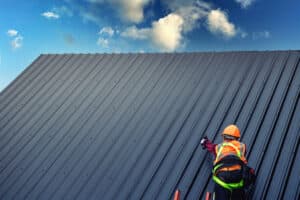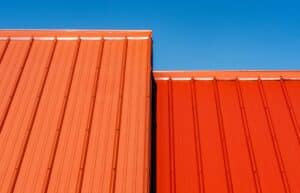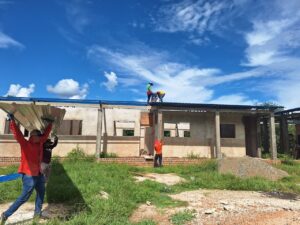Living in Florida comes with many advantages, from beautiful beaches to sunny weather. However, it also means preparing for annual hurricane seasons and taking steps to protect your home from potential damage. One essential component of safeguarding your property is investing in a hurricane-resistant roof. At Stratus Roofing, we understand the importance of a resilient and durable roofing system, so we are committed to providing Florida homeowners with the latest information and expert guidance on the best hurricane-resistant roofing solutions.
In this comprehensive guide, we will discuss the key elements of a hurricane-resistant roof, including top material options, installation techniques, maintenance tips, and additional protective measures. We will explore metal, tile, and asphalt shingle roofing systems, highlighting their unique advantages and potential challenges, to help you make an informed choice for your Florida property.
Furthermore, we will share best practices for maintaining your hurricane-resistant roof and ensuring its longevity, as well as additional protective measures, such as the use of hurricane straps and proper roof ventilation systems. With our guidance, you will be better prepared to face the upcoming hurricane seasons with confidence in the security of your roof and your home.
Top Hurricane-Resistant Roofing Materials: Metal, Tile, and Asphalt Shingles
Selecting the right material is a crucial factor when designing a hurricane-resistant roof. Here are three popular roofing materials suitable for Florida homes, each offering varying degrees of durability, aesthetics, and cost-effectiveness:
1. Metal Roofing
Metal roofs are known for their incredible resilience and longevity, making them an excellent choice for hurricane-prone areas. They can withstand high winds and heavy rains, with some metal roofing systems rated to endure wind speeds of up to 140 mph. Moreover, metal roofs require minimal maintenance and can last for more than 50 years, with some materials like aluminum and copper boasting even longer lifespans.
However, the upfront cost of metal roofs can be significantly higher compared to other materials. Despite the initial investment, their durability, energy efficiency, and low maintenance requirements often justify the expense in the long run.
2. Tile Roofing
Tile roofs, typically made from clay, concrete, or slate, are another viable option for hurricane-resistant roofing. These materials are resistant to water infiltration and can withstand strong winds, especially when using specialized installation techniques, such as mortar-set, foam-adhered, or mechanically fastened tiles.
While tile roofs are known for their durability and visually appealing aesthetics, they can be more expensive and heavier than other materials. It’s essential to ensure that your home’s structure can support the additional weight before opting for tile roofing.
3. Asphalt Shingles
Asphalt shingles are a widely popular roofing material, thanks to their cost-effectiveness and ease of installation. To provide hurricane resistance, look for asphalt shingles with a high wind rating. Some high-quality asphalt shingles can resist wind speeds up to 130 mph when installed correctly with six nails per shingle and proper adhesive methods.
Although asphalt shingles may have a shorter lifespan than metal or tile roofs, they offer a budget-friendly option for homeowners looking to enhance their property’s hurricane resistance.
Installation Techniques & Protective Measures for Hurricane-Resistant Roofs
The installation method plays a critical role in ensuring the durability and wind resistance of your roof. Here are some essential installation techniques and additional protective measures to enhance your home’s hurricane resistance:
1. Use of Hurricane Straps & Clips
Hurricane straps and clips are designed to secure your roof to the walls of your home, preventing it from being lifted or damaged by strong winds. These devices are typically made of galvanized steel and are a crucial element in reinforcing your roof’s structure against hurricane-force winds.
2. Proper Ventilation System
A well-designed ventilation system helps equalize the pressure between the inside and outside of your home during a hurricane, reducing the chances of your roof being blown off due to pressure changes. Ensure your roof has sufficient intake and exhaust vents spaced evenly throughout to maintain a balanced airflow.
3. Professional Installation Services
Enlisting the help of experienced roofing professionals is imperative to ensure that your hurricane-resistant roofing system is installed correctly. They will provide appropriate guidance on selecting the right materials, installation techniques, and protective measures to maximize the durability and safety of your roof.
Maintenance Tips for Your Hurricane-Resistant Roof
Performing regular maintenance on your hurricane-resistant roof can extend its lifespan and enhance its performance during extreme weather events. Here are some essential maintenance tips for your roof:
1. Inspect Your Roof Regularly
Regularly inspect your roof for signs of damage, such as missing or broken shingles, cracked tiles, or rusted metal. Address any issues immediately to prevent further deterioration of your roof and maintain its hurricane-resistance.
2. Keep Gutters & Downspouts Clean
Ensure that your gutters and downspouts are free of debris to maintain proper rainwater drainage. This helps prevent water damage to your roof and ensures its optimal performance during heavy rainstorms.
3. Trim Nearby Trees
Trim any tree branches that may come into contact with your roof during a hurricane. Falling branches can cause significant damage, so it’s best to eliminate potential hazards before the storm season arrives.
Conclusion
Florida homeowners must take every precaution to protect their homes against hurricanes and extreme weather events. By exploring various hurricane-resistant roofing materials, understanding installation techniques, and implementing essential maintenance practices, you can create a safe, durable, and resilient roofing system for your home. With the right materials, professional installation, and proper maintenance, you can enjoy peace of mind knowing your home is prepared to weather the storm.
Ready to invest in a hurricane-resistant roofing solution for your Florida home? Contact Stratus Roofing today for expert guidance and personalized recommendations from our experienced team!







